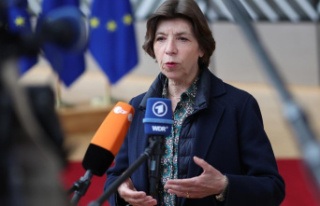Abel Lázaro Machado, Maikel Puig, Yasiel Martínez, Lidier Hernández, Yosvany Rosell, Nilo Abrante... They are only a part of the fifteen political prisoners, out of a total of 1,045 under padlock in the dungeons of the Cuban regime, who have declared themselves on hunger strike to demand their freedom before Josep Borrell, high representative of the European Union (EU), disembarked in Havana to co-chair the third joint council between the EU and the Cuban government.
A visit under pressure, as dissident organizations and human rights organizations on the island have been in charge of reminding the former Spanish Foreign Minister. Faced with European interests, Borrell was determined to recover lost ground in the Americas, and in the middle of a romance between Havana and Moscow, which he has sent to the island in a little over a month to four of his senior officials. The Castro revolution has also just admitted that it will send the military to train in Belarus with the forces of the dictator Aleksandr Lukashenko.
Borrell's announcement, in which he highlighted the validity of the Political Dialogue and Cooperation Agreement that has existed with Havana since 2016, was received with a shower of reproaches. "If you defend sanctions against Russia, how is it possible that you travel to Cuba, Putin's main ally in Latin America, and act to normalize the dictatorship, helping to finance the leadership in power through a cooperation policy that ignores the oppressed and persecuted," stressed dissident Carolina Barrero. The main claim to Borrell is that she intercede for the political prisoners.
The agreement between Cuba and the EU predates the social rebellion of 11-J of 2021, which led to the radicalization of the policy of terror and persecution against those who protested in the streets. Another of the consequences of these events is the new migratory wave, the largest in Cuban history, with more than half a million Cubans fleeing the island.
Borrell yesterday chose a group of small and medium businessmen for his first Havana meeting, in which he highlighted those who "have the courage and ability to undertake" in today's Cuba. "I am sure that Cuba will end up being the Mallorca of the Caribbean," Borrell predicted. The EU is today the main investor in the island and concentrates a third of foreign trade, ahead of Russia or China.
However, "the success of his visit will depend on whether he achieves the release of the political prisoners," the Cuban Observatory for Human Rights warned him.
"We call on Borrell to insist on the need for an amnesty and decriminalization of dissent, which is what leads those who demonstrate to prison just for exercising their fundamental rights. Also, remember the relationship between democracy and foreign policy, there are a weakness in the international order by countries that have not recognized civil society, democracy and the rule of law. The recognition of internal civil society is key in this political and cooperation dialogue that Borrell maintains with the Cuban government" Manuel Cuesta Morúa, vice president of the Council for the Democratic Transition in Cuba, specified for EL MUNDO.
Parallel to Borrell's landing in Cuba, the first he has made since his arrival in Brussels, the government agents accentuated the repression against the prisoners themselves and their families. "Make a lot of complaints, they are under high pressure. You have to say 'patria y vida'. I'm planted!", said the prisoner Maykel Puig from the Quivicán prison, in the province of Mayabeque, adjacent to the capital before to cut off the telephone communication he had with his wife. Puig denounced that several of his colleagues are missing and that they were being repressed. Several of the prisoners on hunger strike have denounced torture inside the prisons.
Saily Núñez, Puig's wife, is one of the family members surrounded by State Security so that they cannot leave their homes these days.
Despite the importance of Borrell's trip, the revolution keeps him in a third plane of its propaganda, concentrated as it is in the evolution of the extraordinary session of the National Assembly of People's Power, which has the presence of Raúl Castro, and in the plenary session of the Central Committee of the Communist Party of Cuba (PCC).
According to the criteria of The Trust Project












